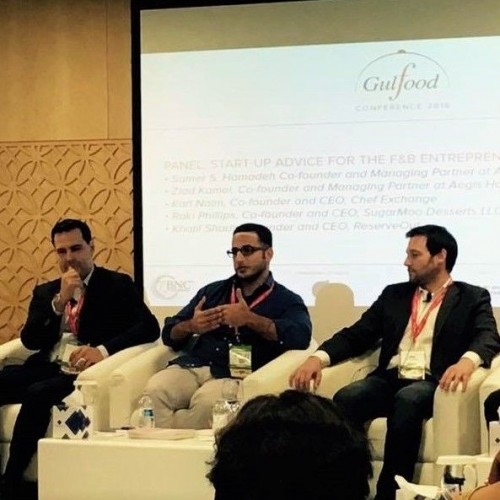Panellists at the Start-up Advice for the F&B Entrepreneur discussion at the Gulfood Conference advised new F&B business operators to be humble, to take advice from the right people, and to negotiate carefully with partners in order to successfully enter the market.
Samer S. Hamadeh and Ziad Kamel, co-founders and managing partners of Aegis Hospitality; Karl Naim, co-founder and CEO of ChefXChange; Raki Phillips, co-founder and CEO, SugarMoo Desserts and Khalil Shadid, founder and CEO of ReserveOut came together at Dubai World Trade Centre on Sunday 21 February to share their advice with budding F&B start-ups in the region.

Hamadeh and Kamel of Aegis agreed that F&B entrepreneurs must be wary about the people they take advice from.
“My advice is not to take advice,” commented Hamadeh, who added that advice from friends and family or anyone else with an emotional stake in business decisions should be avoided.
“Nobody is in your shoes, nobody wants to do what you want to do necessarily and the odd people doing the exact same thing are rare,” he said.
Meanwhile, his business partner Kamel, said that advice should be sought from the right professionals in order to clearly map out your business plan.
“[You should get] sound advice from people that do know what they’re talking about – legal experts, financial experts.
“Dubai is a big market but you need to know how to tread; you don’t want to expose yourself too much,” he said.
Kamel also warned that resilience is key at the start, and once a business plan is solid, it’s important to overcome the teething problems.
“Once you have your idea and start implementing it, you need to keep pushing to overcome all obstacles; it is possible, but there’s only one person who can either make it or break it and that’s you,” he said.
Agreeing with Kamel’s sentiment, ReserveOut’s Shadid added that F&B entrepreneurs must “throw ego out of the window” in order to get ahead.
“All of us at some point made an assumption and it didn’t work and the reason we’re still here and still successful is we were able to pivot quickly; to identify where we had to make a turn and then make that turn being humble.
“You must focus on understanding your market – what are you going to be doing, who are you selling to, what’s the price point, is there someone out there willing to pay for this? That’s how you validate a business,” he said.
Some of the key stumbling blocks in the first phase of starting up a business were also highlighted ̶̶ the toughest of these being partnerships, according to SugarMoo’s Phillips.
“I think the biggest thing is the vendors we work with – nobody will ever stick to a contract, nobody will ever deliver on time or keep a promise,” he said, advising start-up businesses to be tough on suppliers to avoid being messed around at the beginning.
“I’d say negotiate terms that benefit you. If someone is delayed in delivering you something, charge them a penalty, renegotiate your fees,” he said.
Naim of ChefXChange agreed, and suggested that start-up businesses should focus on themselves to begin with rather than diving into partnerships too quickly.
“We spend a lot of our time trying to build partnerships with companies that are more established than we are, and with suppliers.
“It’s very time consuming and sometimes I think it’s not worth it. Maybe it’s better to focus on what you are actually doing, rather than trying to partner,” he said.
The Gulfood Conference, produced by BNC Publishing took place from 21 – 23 February at Conrad Dubai and Dubai World Trade Centre.
The Conference tackled some of the key issues impacting the F&B industry in the Middle East including the start-up landscape, franchising, financing, food security, halal opportunities and public health and the food industry.
A full review of the conference will be available in the March issue of Catering News Middle East.


































































